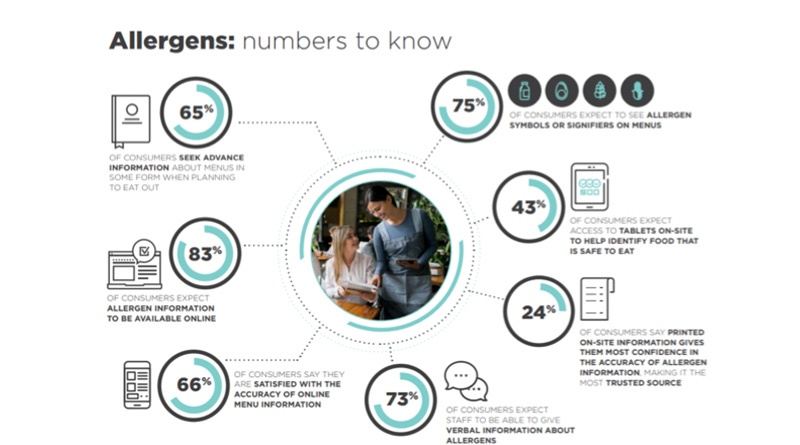Consumers Demand More From Operators When It Comes To Allergen Advice

Consumers are demanding more from hospitality operators when it comes to allergens than simply ticking the legislative box, according to the latest insight from CGA and Zonal’s GO Technology research.
With high profile cases dominating the headlines, the issue of allergen management and availability of information is very much front of mind for today’s consumers.
Genuine engagement, with on-demand access to accurate, up to date allergen information is key, with more than four in five (83%) of the 5,000 UK adults surveyed expecting to have details made available online.
However, although online information about menus is crucial, consumers also want to access the facts when they are in-venue, with 75% expecting to see allergen information on materials, such as menu symbols and signifiers, acting as quick and simple points to highlight relevant information.
Almost three quarters (73%) of those surveyed also stated that they expect staff to be able to give verbal information about allergens at point of order, with a smaller but still sizeable number (44%) seeing it as the responsibility of managers or supervisors to know this information and come to a table to take orders if required.
With rising awareness of allergens coupled with changing dietary requirements, the challenge for operators is how to ensure accurate allergen information is made available at every customer touch point – whether a customer is searching for a venue on their mobile or walking in off the street. And this is where technology plays a major part in the solution for operators and the wider supply chain, according to Zonal.
Director of online commerce, Helen McMillan, said: “The GO Technology report tells us how important it is for operators to invest in integrated technology. Recipe, menu and purchasing systems simply must be aligned in order to deliver the level of accurate and detailed information that today’s consumers both need and expect.
“This approach will give the confidence needed by operators and customers alike in the accuracy of the information that often crucial decisions are being based upon. This is not only essential for building brand loyalty and earning confidence, respect and credibility with customers, but also for legislators and those seeking to enforce it.”
The survey also highlighted that those who show interest in advance and seek allergen information is significantly higher among young adults. Three quarters (75%) of those aged 18 to 34 say they look for it now—compared to just over half (56%) of those aged 55+. Women and Londoners were also more likely to seek out allergen and nutritional information.
Karl Chessell, Business Unit Director, Retail and Food, CGA said: “Food safety is a top concern for all businesses in the out-of-home food and drink sector, and the need for vigilance on allergens has never been greater. But as this GO Technology research shows, it’s not just legal requirements that should be motivating operators to be concerned about this issue.
“Consumers want genuine engagement and comprehensive, accurate information about allergens—and they expect to be able to access it easily. From websites to menus to staff, brands need to be able talk confidently about allergens and inspire confidence among their guests. If they can do so, there is an excellent opportunity to secure the respect and loyalty of the growing number of people with dietary requirements and establish a competitive advantage.”
